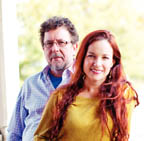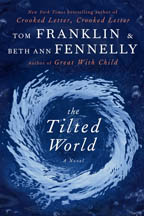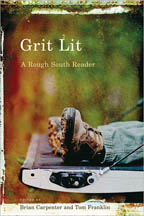Beth Ann Fennelly and Tom Franklin

Biography
Beth Ann Fennelly has won grants from the National Education Association (NEA) and United States Artists as well as a Fulbright Scholarship to Brazil. Her honors include the Kenyon Review Prize and three inclusions in The Best American Poetry. Fennelly has published three volumes of poetry along with her nonfiction book, Great with Child. She directs the University of Mississippi's MFA program where she was named the 2011 Outstanding Teacher of the Year. Fennelly is married to author Tom Franklin. They live in Oxford, Miss., with their three children.
Tom Franklin is the award-winning and New York Times best-selling author of Crooked Letter, Crooked Letter, which was nominated for nine awards and won the Los Angeles Times Book Prize and the prestigious Crime Writers' Association Gold Dagger Award. His previous works include the Edgar-winning story, Poachers, from the collection under the same title, as well as Hell at the Breech and Smonk. Winner of a 2001 Guggenheim Fellowship, he teaches in the University of Mississippi's MFA program.
Schedule
Will post information when available

The Tilted World: A Novel
The year is 1927, and the heavens have released the most fearsome deluge America has ever seen...
This is the story of an unhappily married woman who dies a little every day and a noble yet solitary man who feels invisible. Of an orphaned baby, a troubled uncle, a dangerous flapper, a loyal partner, a flood that will change a people and a nation.
This is the story of a bootlegger and a federal agent — natural enemies who fall in love.
This is The Tilted World, the extraordinary new novel from Los Angeles Times Book Prize winner Tom Franklin and acclaimed poet Beth Ann Fennelly.
Tom Franklin

Grit Lit: A Rough South Reader (Editor)
An anthology of memoir and fiction by some of the most acclaimed writers in contemporary Southern literature
Drawing on storytelling traditions as old as Southern literature itself, Grit Lit is the first anthology devoted to contemporary writing about the rough South. From literary legends to emerging voices, the acclaimed writers featured in this collection view their hardscrabble South without romanticism or false nostalgia — not through moonlight and magnolia, but moonshine and Marlboros.
This is the dirty South as captured by those rooted in its land yet able to share its stories with candor and courage. Grit Lit guides readers through tales both tall and true, intoxicating stories of loss, violence, failure, feuds, family and, above all, survival against the odds. Raw and raucous, Grit Lit gathers some of the most provocative writing to come out of the South in the last 30 years. With a preface by Edgar Award-winning author Tom Franklin and Brian Carpenter's introduction to the genre's origins and influences, this bold anthology lays bare the rough South in all its battered glory and dares readers not to stare in awe.

Q&A
What is the most important lesson readers can learn from your book The Tilted World?
Tom: I want readers to be entertained and enlightened. I want them not to be able to stop reading. I don't want them to learn a lesson per se, though I like the parallels the 1927 flood has with Katrina, where poor people were screwed (again) by the rich.
Beth Ann: The Tilted World is based on a historical event, the flood of the Mississippi River in 1927, a flood which destroyed 50,000 homes and was the greatest national disaster our country had ever seen. We focus on two people whose fates become tied to the flood. We alternate chapters between these two point-of-view characters, a female bootlegger and a male revenue agent, creating a novel that’s about 100,000 words. Our is a story of a flood, but also a love story, and, bigger, the story of how individuals come together to form a family.
What motivated you to tell this story?
Tom: That this is arguable the worst natural disaster in our country's history, and few people know of it. Also, the characters were compelling to me.
Beth Ann: The literary world is often dominated by the coasts, but this great big Southern story begs to be told. We first discussed this after Katrina, when the government showed an appalling lack of concern for the affected Southerners. The flood of 1927 was similar--a region the size of New England was drowned. If it HAD been New England, the event would be in every history book. Instead, the folks affected were mostly the disenfranchised, poor sharecroppers, black and white. But this flood affected our country in many ways--it ushered Hoover into the Whitehouse; it created a mass exodus of African Americans up north, many to Chicago; it prodded the government to consider forming a national emergency response team, so was the instigator for FEMA.
We wish our novel to imaginatively recreate this disaster for two characters in such a way that they become people—the reader thinks their thoughts and feels their feelings, cloaks them with flesh, hears them talk and sees them fight, and love, and live.
What was the most enjoyable part of the process of writing this book?
Tom: Writing it with my best friend and wife, Beth Ann. Writing is usually and necessaarily lonely. Not so in this case.
Beth Ann: Collaborating with my best friend! The novel has two point of view characters. There’s a female point of view character who’s a bootlegger. The male point of view character is a revenue agent. So you can see the natural conflict. When we began the novel, I was purely writing from the female character’s point of view, while Tommy was writing from the male character’s point of view. It was actually going pretty slowly, partly because Tommy was out on book tour for his novel, Crooked Letter, Crooked Letter. We were making some headway, but not a lot. It actually became a lot more fun and started going more smoothly when we started doing what we called dueling laptops. This is where we would be writing together in the same room, side by side, each on our own laptop. We’d start with the idea: okay we know we need this scene on the levee, and we know this person has to be arrive on the scene, and this conversation has to take place. He’d be writing the scene on his, and I’d be writing it on mine. After a while we’d stop and read our parts to each other. Sometimes we’d take all of one person’s, sometimes we’d combine some, or do something different entirely from an idea one of us had gotten from the writing. When we started doing that, the writing became more fun and surprising things were happening. I’ve always been jealous of what musicians have when they play together on stage because writers don’t get that. You don’t get the ability to feed off of someone else on stage, or be inspired by someone else, or have that idea of a group making something together. We had that a little bit with writing this novel.
What should people look forward to by coming to your presentation at the festival?
Tom: I'll talk about the hardships and rewards of writing, and how they're closely related.
Beth Ann: People have told Tommy and me that together on stage we have a great back-and-forth. I hope so, at least--we’ve been married 15 years! But I do think things are a little looser and more lively when we’re up there together. And the LA Book Fest is one of our favorites--we love zipping around the capitol in golf carts driven by manical volunteers, and stocking up on donuts in the hospitality tent, and visiting all the booths selling wonderful books! This year we’ll have our three kids with us, so we’ll take advantage of all those fabulous family entertainment offerings as well.
Volunteer
Book-loving volunteers are essential to the Louisiana Book Festival's success. Whether it's escorting authors, guiding visitors, selling refreshments, working with children in the Young Readers Pavilion or other fun and rewarding assignments, the Louisiana Book Festival wants you to join the volunteer team.


